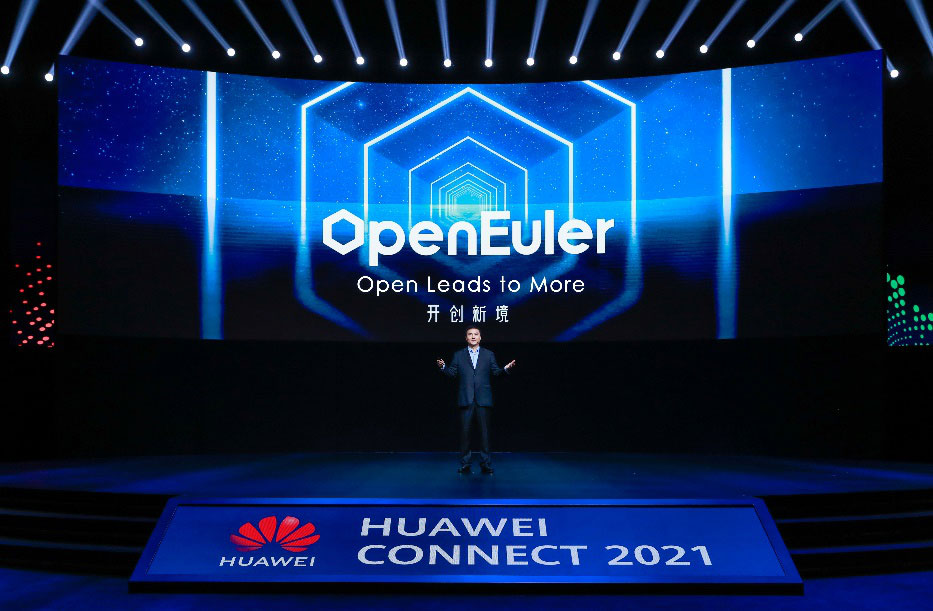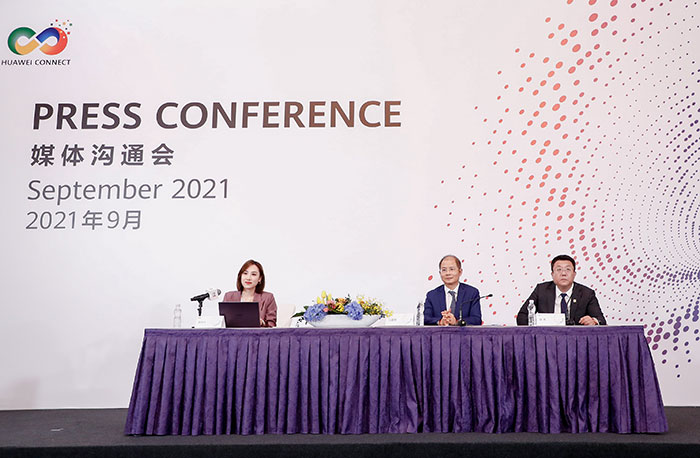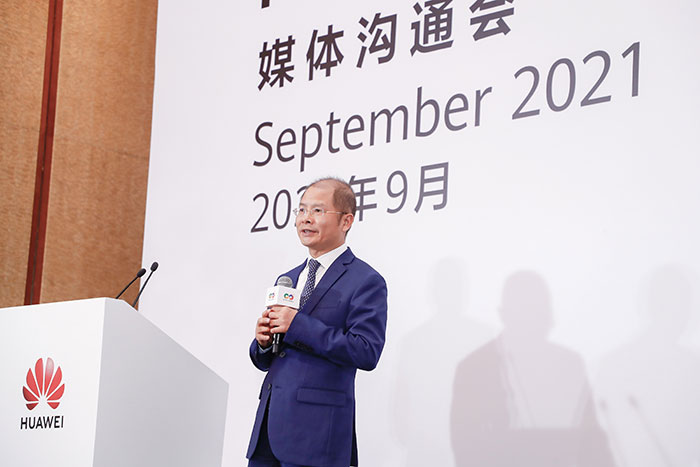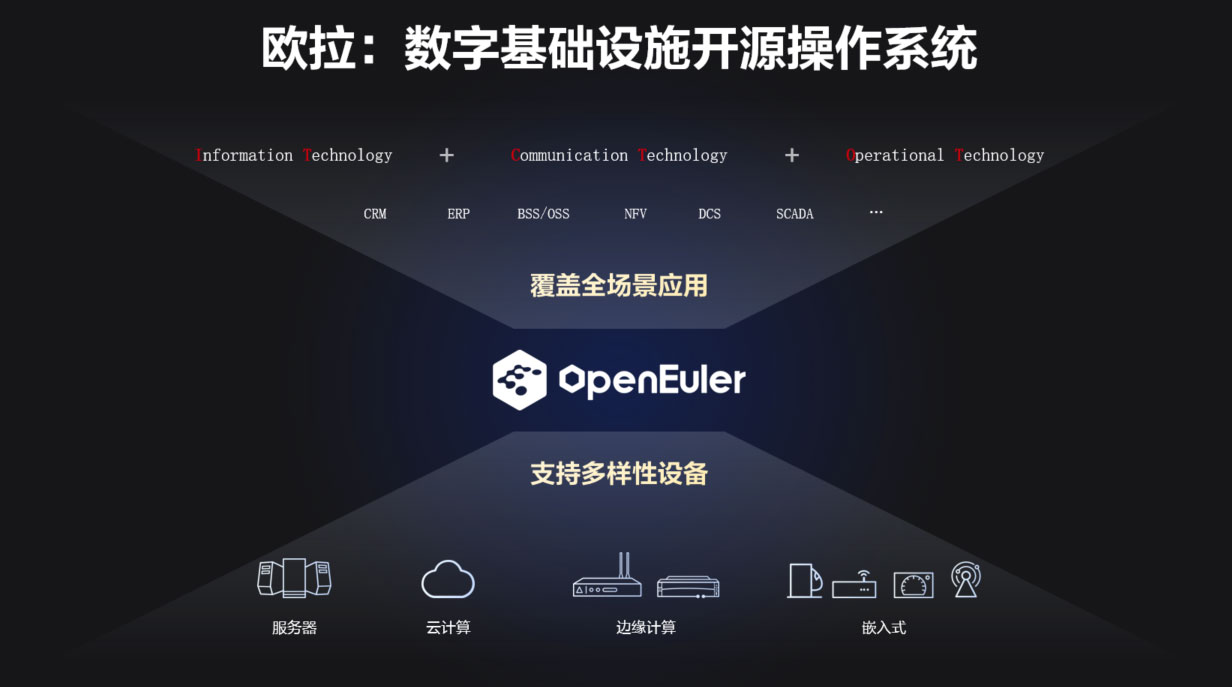Cast souls! Huawei released a brand-new operating system Euler, how to get through with HarmonyOS?
[Text/Observer Network Zhou Yuanfang Editor/Xu Ganang]
If all the planning goals about Euler can be realized, the problem of "lacking core and soul" that plagues China will be solved by half, and our country will have a "soul", Xu Zhijun, the rotating chairman of Huawei, told Observer.com and other media on the 24th.
At 9: 00 am on September 25th, Huawei released its new operating system, openEuler.

On the eve of the release, Xu Zhijun was interviewed at the HC China Media Communication Meeting of Huawei Full Connection Conference. He said that Euler’s operating system is positioned as a digital infrastructure operating system, and its main application scenarios are service-oriented, edge computing, cloud and embedded systems; The main application scenarios of HarmonyOS operating system are intelligent terminals, Internet of Things terminals and industrial terminals.
In the future, the underlying technology will be shared between HarmonyOS and Euler, so that devices installed with two operating systems can be connected to get through the two operating systems.

"Euler already had it."
"Euler’s operating system is not a new thing. In fact, Euler has existed for a long time. It is only because President Ren mentioned Euler in his recent speech that it attracted everyone’s attention," Xu Zhijun told Observer.
EulerOS, the server operating system independently developed by Huawei, is based on Linux stable system kernel, supports Kunpeng processor and container virtualization technology, and is a general server architecture platform for enterprises.
At first, when Huawei started to build Kunpeng Ecology in 2019, it positioned Euler as the operating system serving Kunpeng servers.
On July 23rd, 2019, the first "Kunpeng Computing Industry Summit" was held in Beijing, and Huawei released the "Kunpeng Lingyun Partner Program" based on Kunpeng chips. At that time, it was clearly stated that in order to support the development of Kunpeng, the Euler operating system developed by Huawei for nearly 10 years was open source.
On December 31, 2019, the Euler operating system was officially open source. Xu Zhijun pointed out that in fact, the open source version at that time was already a commercial version widely used by Huawei around the world.
Since then, openEuler has grown rapidly as an open source community. In 2020, there will be more than 3,000 developers in the openEuler open source community and more than 40 system interest groups (SIG). At present, there are more than 6,000 developers and 89 SIG, and the number of software warehouses has reached more than 8,000. The download and use of openEuler has spread to 54 countries and 1000+ cities around the world, with 25w+ downloads, which has become one of the most concerned open source projects for global developers.
As time goes by, Euler gradually shows stronger vitality.
Recently, Ren Zhengfei said at the Innovation Pioneer Symposium of Huawei Academia Sinica: Under the sanctions of the United States, Huawei cannot produce the best products with the best parts, but Huawei strives to create high-quality products with the most reasonable parts. In order to oppose the sanctions of the United States, Huawei HarmonyOS and Euler have a long way to go. Huawei Euler not only faces the server, but also the communication and real-time operating system, which protects the national data and information security.
Ren Zhengfei said that Euler is making great strides. Euler’s positioning is aimed at the operating system and ecological base of the national digital infrastructure, and it undertakes the historical mission of supporting the construction of a leading, reliable and safe digital foundation.
This means that Huawei has made adjustments in the positioning of Euler. Xu Zhijun said that the original plan was to let Euler serve Kunpeng Ecology more, and now it has been positioned as a future digital infrastructure operating system. I hope it can support not only Kunpeng, but also X86, edge computing, cloud infrastructure and embedded devices.

Solve the urgent problem of "lack of core and soul"
Euler and HarmonyOS came into being. For a long time, the online information industry in China has always faced the dilemma of "lack of core and soul", which is as urgent as "lack of core". Now everyone knows that the problem of "lack of core" is serious. Any modern digital device must have a chip, but without a set of basic software such as operating system, database, middleware and programming language, the chip can’t work. In the digital infrastructure system, the importance of basic software is incomparable.
At present, China has already felt the pressure in the field of chips. It seems that it has not encountered such serious problems in the fields of operating system and database, but some signs have sounded the alarm. CentOS’s neutral development strategy is challenged, CentOS 8 will stop maintenance at the end of this year, and the current open version no longer supports normal commercial release, which has greatly affected domestic users and urgently needs to find alternatives.
In fact, the industry realized the problem long ago and put forward the "casting soul project".
In 1986, Sun Yufang, a teacher of Chinese Academy of Sciences, as a pioneer, introduced, analyzed and sorted out a lot of information about UNIX operating system, and transformed these materials into the teaching and scientific research foundation of domestic operating system. Around 2000, Linux was introduced into China, which provided a rare opportunity for China manufacturers to develop domestic operating systems. In 2008, China officially launched the "Nuclear High Foundation" national major project covering core components, high-end general-purpose chips and basic software, during which Linux and Android were deeply analyzed, providing domestic server manufacturers, mobile phone manufacturers and other intelligent terminal manufacturers with operating system talents and technical reserves.
In 2018, some manufacturers who gradually gained a foothold in the market competition made some commercial breakthroughs. In the field of servers, Kirin operating system has occupied a relatively large domestic market share. Huawei’s Euler operating system has also been deployed and applied in key fields such as telecommunications, finance and energy. In the field of PC and notebook, the adaptability of the desktop operating systems of UNITEX UOS and Zhongke Fangde is outstanding.
However, although the operating systems developed by domestic manufacturers are becoming more and more mature, facing the strong first-Mover advantage of Microsoft and Google, it is difficult to achieve "overtaking" without special opportunities for industry development.
The window period is emerging, and people in the industry analyzed Observer.com a few days ago. First of all, from the technical level, the dominance of X86 architecture on PC side is being broken, and various heterogeneous computing and AI computing scenarios on server side are beginning to rise. Different computing architectures have put forward new requirements for operating systems. Although different operating systems can meet the needs of different underlying hardware architectures, it will lead to many "chimneys" in the entire digital infrastructure architecture, which will lead to disasters for top-level application developers. The market urgently needs a unified operating system that can meet the diverse hardware requirements, and it is possible for future versions of Euler’s operating system to be unified at this level, which is Euler’s opportunity.
Secondly, from the commercial point of view, in the field of database operating system and server operating system, some business models have gradually changed, which has brought a lot of influence on the upstream and downstream pattern of the industry, and this has also become a business opportunity for Euler operating system.
Third, in terms of geopolitical influence, the present is a good opportunity for related industries and enterprises in China. Relying on the size of China market, there is enough space to develop an independent basic software and operating system industry. Moreover, once such basic software and operating system are mature and form some unique advantages of their own, they are likely to be able to go overseas through their own late-comer advantages.
How did HarmonyOS and Euler get through?
Talking about the relationship between Euler’s operating system and HarmonyOS’s operating system, Xu Zhijun first explained the complementarity between HarmonyOS and Euler in positioning.
"With regard to the HarmonyOS operating system, we originally expected to build an operating system oriented to the Internet of Everything, but when it is oriented to a single intelligent terminal, it will essentially replace the Android operating system," Xu Zhijun said. "On the basis of having the capabilities of the Android operating system, it has increased the distributed capabilities, enabling various terminals to be interconnected with each other, such as computers and mobile phones."
Xu Zhijun pointed out, "HarmonyOS has several uses. First of all, you can develop various IoT terminals based on the open source HarmonyOS operating system. These IoT terminals can be integrated into the HarmonyOS ecology, so that all mobile phones and terminals using this operating system can be connected. Let consumers experience better; Secondly, we have begun to have applications that are native to HarmonyOS system. There is also a type of company that participates in HarmonyOS’s open source and contributes to making open source HarmonyOS more and more powerful and more able to meet the needs of various intelligent terminals. "
"In this case, Huawei will build two operating systems in the future," Xu Zhijun said. "One is the open source HarmonyOS operating system, and the other is the open source Euler operating system. The main application scenarios of HarmonyOS operating system are intelligent terminals, Internet of Things terminals and industrial terminals. The main application scenarios of Euler operating system are server-oriented, edge computing, cloud and embedded systems. "

Xu Zhijun said, "In the future, between HarmonyOS and Euler, we will share the underlying technology and embed the most advantageous part of HarmonyOS, that is, the distributed soft bus, into the Euler operating system, so that the devices that install these two operating systems can be connected, thus opening up the two operating systems."
"Now, through HarmonyOS and Euler, we want to build an operating system covering all scenarios, all open source, let the industry participate, make it better, and be suitable for more products," Xu Zhijun pointed out. "After we reposition the role of Euler’s operating system, if we can get active support from the industry and achieve all the current planning goals through joint efforts, China’s" Soul Casting Project "will be able to achieve its goals, and our country will have". It can really solve the problem of "little soul" of China’s information infrastructure, solve several key problems of information security, and also solve the problem that all walks of life need operating systems. "
However, companies that develop applications on the release of Euler are no different from those that develop applications on other operating systems. Xu Zhijun pointed out that, like the previous "HarmonyOS concept stocks", Euler may be hyped again.
"From the perspective of digital infrastructure, Euler really solved the problem of" little soul "and also solved the problem that we need operating systems in all walks of life. However, development companies will not get extra income just because of the development on Euler, "Xu Zhijun said frankly." Only companies that make distribution based on Euler can create income. Whether other companies that speculate can create income and create value based on Euler, everyone should keep their eyes open. "